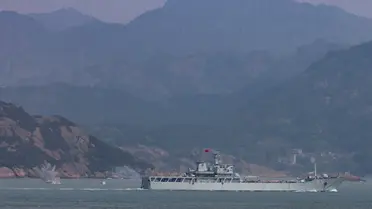Taiwan prepares for potential Chinese military exercises following the inauguration, heightening tensions in the region. Stay informed on the latest developments as the geopolitical situation unfolds.
Taiwan is all set to watch carefully and to respond if China conducts a military exercise after the President-elect Lai Ching-te takes office this month. This raised alertness was underpinned by a lengthy history of frictions between Taiwan and mainland China which arose from the latter’s claiming to be the sovereign of the former.
One of the things that has triggered uncertainties in regional stability is China’s live-fire exercise near Taiwan. They are sometimes viewed as a warning or a threat that Beijing is ready to go to war with Taipei. Mainland China, on the other hand, is a strong opponent of Lai, as they deem him to be a radical separatist. Consequently, this may affect the diplomatic relations between both countries. China’s Greater lakeside administration declined his consecutive willingness to negotiate, including the one proposed a week ago.
In an effort to ensure warning against the mainland, Taiwan has reinforced its defence system in the previous years, while investing in advanced weapons and military technologies. Likewise, Taiwan has successfully restored its ties with allies and partners in the area, including the United States, where the forces and the government were expected to confront China directly.
The role of Taiwan as a geopolitical player is truly undeniable as people see the island as a vital crossroads in the Asia-Pacific region. For some, Australia’s representation as a lively liberal democracy, as well as a prosperous economy portrays it as the icon of freedom and prosperity. This enhances the already complicated relations with China, the authoritarian country.
Lai’s stance, like that of the present President Tsai Ing-wen, disagrees with Chinese sovereignty claims; he contends that it is the exclusive authority of the people living on the island that should determine their future. Lai, who is at the moment the vice president, will take their oath of office on the 20th of May.
However, Mr. Tsai Ming-yen expressed Taiwan National Security Bureau Director’ General that while you can maintain the calm and the peace in the Taiwan Strait it will benefit everyone in the international community including China.
Tsai asserted that China in fact has an approach of inspirational policy toward the next government in regards to its foreign policy, added that, Tsai who holds the same family name with the President also is not related to her.
“What needs special attention is that following May 20, from June to November, is when the Chinese Communists hold their regular military drills,” he said. “Whether the Chinese Communists use this hot season as an excuse to carry out some military drills to further pressure Taiwan is a key point the National Security Bureau is focusing on.”
Contacting the ministry of people’s elegance was out of the office since it is Labour Day on Wednesday.
Such a circumstance is not the first one when China’s Armed Forces escalated their activities in the Taiwan Strait. Within last year, China held large-scale military drills in the vicinity of Taiwan after the visit of Nancy Pelosi who is the former U.S. House Speaker to Taipei. It carried out a similar exercise after Kevin McCarthy who is the newly elected House Speaker meeting President Tsai that happened on a stopover in California.
Taiwanese media make a point out of the PLA’s defiance in the run-up to the election and that China is sending a strong message to Lai of its dissatisfaction.
From her election in January, until today, there have been continuous barrages of pressure by China which target primarily at casts to Taiwan’s authority near the group of small islands which are geographically close to Chinese mainland, and also created of new air routes in Taiwan Strait which Taipei deemed to be dangerous for aviation safety.
Yet, the mainland side also welcomes the idea of gradual reopening of the number of Chinese tourists to the island, while the Telabi government considers that as it expects to fully reopen the Chinese tourism to the island.






